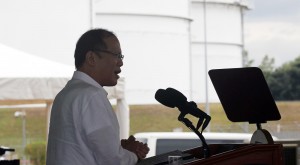Aquino meets members of Bangsamoro transition commission
MANILA, Philippines—President Aquino on Thursday met with members of the Bangsamoro Transition Commission (BTC) in Malacañang, sending a clear message that he has given tacit recognition of its authority to draft the Bangsamoro basic law that will be submitted to Congress in May.
The 15-member commission led by Mohagher Iqbal paid a courtesy call on
Aquino amid clashes between government forces and breakaway rebels of the Bangsamoro Islamic Freedom Fighters (BIFF) in Maguindanao province.
It was supposed to be only a photo opportunity, but the
President used the occasion to make known his marching orders to the BTC members.
Article continues after this advertisementAccording to his spokesman Edwin Lacierda, the President met with the BTC members for about 45 minutes and “emphasized the timeline required for the passage of the BBL.
Article continues after this advertisement“Upon approval of the draft by the President, he will certify the bill urgent [to enable] Congress to enact it into law as early as possible,” Lacierda said in a text message. “The President assured the commission of his support to the passage of the [law].”
Those who met with the President were members of the government and MILF peace panels—Iqbal, Melanio Ulama, Asami Tamang, Said Shiek, Fatmawati Salappudin, Akmad Sakkam, Hussein Munoz, Froilyn Mendoza, Raissa Jajurie, Pedrito Eisma, Abdulla Camlian, Talib Benito, Robert Alonto, Ibrahim Ali, Miriam Coronel-Ferrer, Senen Bacani and Yasmin Busran-Lao.
“There was one member [of the commission], Johaira, the youngest member, who was not present because her father passed away,” Lacierda said.
Also present were Executive Secretary Paquito Ochoa Jr., Presidential Adviser on the Peace Process Teresita “Ging” Deles and Finance Secretary Cesar Purisima.
Earlier, Malaysian peace facilitator Abdul Ghafar Tengku Mohamed paid a courtesy call on the President.
Communications Secretary Herminio Coloma said the two incidents—talking peace at the highest levels while engaging in military offensive against rebel forces—were not incongruous.
The military offensive against the BIFF followed “accepted rules of engagement,” including protection of human rights by avoiding “indiscriminate use of force,” Coloma said.
“What we know, and this was acknowledged also by [the] MILF, is that they themselves pledged to cooperate in the initial operations especially insofar as their determination to prevent BIFF elements from intruding into known MILF communities,” he said.
